浅谈中国跨国公司的跨文化管理战略(翻译)
中国跨国公司的跨文化管理分析
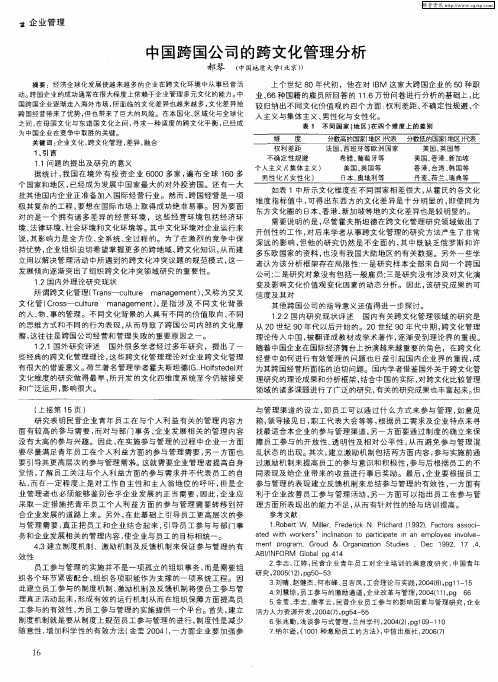
关 键 词 : 业 文化 , 文 化 管理 , 异 , 合 企 跨 差 融
个 国 家和 地 区 , 已经 成 为 发 展 中 国 家 最 大 的 对 外投 资 国。 还 有 一 大 如表 1中所示文化维度 在不同国家相差很大 , 从霍 氏的各文化 批其 他 国 内企 业 正 准 备加 入 国 际经 营行 业 。 然 而 , 国经营 是 一 项 跨 维度指标值中 , 可得 出 东 西 方 的 文 化 差 异 是 十 分 明 显 的 , 即使 同为 极 其 复杂 的工 程 , 想 在 国 际 市 场 上 取 得成 功绝 非 易事 。 因为 要 面 要 东 方 文化 圈 的 日本 、 港 、 加坡 等 地 的文 化 差异 也 是较 明显 的 。 香 新 对 的 是 一 个 拥 有 诸 多 差 异 的 经 营 环 境 ,这 些 经 营 环 境 包 括 经 济 环 需要 说 明 的是 , 管 霍 夫 斯 坦 德 在 跨 文化 管理 研 究 领 域做 出 了 尽 境 、 律环 境 、 会环 境 和 文化 环 境 等 。 中文 化 环 境 对企 业 运 行 来 法 社 其 开创性的工作 , 对后来学者从事跨文化管理 的研究 方法产生了非常 说 , 影 响 力是 全 方位 、 系统 、 过程 的 。 为 了在 激 烈 的竞 争 中 保 深 远 的 影 响 , 他 的研 究 仍 然 是 不 全 面 的 , 中 既 缺 乏俄 罗斯 和 许 其 全 全 但 其 持优 势 , 企业 组 织 迫 切 希 望 掌 握 更 多 的跨 地 域 、 文化 知 识 , 而 建 多 东 欧 国 家 的资 料 , 没 有 我 国大 陆 地 区 的有 关数 据 。 另 外 一 些 学 跨 从 也 立 用 以解 决 管 理 活动 中所 遇 到 的跨 文 化 冲 突 议题 的 规 范模 式 , 一 者 认 为 该 分析 框 架 存 在 局 限 性 : 是研 究样 本 全部 来 自同 一 个 跨 国 这 一 发展倾 向逐渐突出了组织跨文化冲突领域研究的重要性。 公 司 : 是研 究对 象没 有 包 括 一 般雇 员: 是研 究 没 有涉 及 对 文 化 演 二 三 12国 内 外理 论研 究现 状 . 变 及 影 响 文化 价 值 观 变 化 因 素 的动 态 分析 。 因此 , 该研 究 成 果 的 可 所 谓 跨 文 化 管理 (rn- c l r ma a e n )又 称 为 交 叉 信 度 及其 对 Ta s u ue t n g me t , 文 化 管 ( rs- c l r ma a e n )是 指 涉 及 不 同 文 化 背 景 C o s u ue t n g me t , 其他 跨 国公 司 的指 导意 义还 值 得 进 一 步 探讨 。 的人 、 、 的管 理 。 不 同 文化 背 景 的人 具 有 不 同 的 价值 取 向 、 同 物 事 不 122国 内研 究 现 状 评 述 国 内有 关 跨 文 化 管理 领 域 的研 究 是 __ 的思维 方式 和 不 同 的 行 为 表现 , 而 导 致 了 跨 国 公 司 内部 的文 化 摩 从 2 从 0世 纪 9 0年 代 以后 开 始 的 。2 0世 纪 9 0年 代 中 期 , 文 化 管理 跨 擦 , 往 往 是跨 国 公 司经 营和 管 理 失 败 的重 要 原 因之 一。 这 理 论 传 入 中 国 , 翻 译 成 教 材 或 学 术 著 作 , 渐 受 到 理论 界 的重 视 。 被 逐 121国 外 研 究 评述 国外 很 多学 者 经 过 多 年研 究 ,提 出 了一 随着 中国企业在国际经济舞台上扮演越来越重要 的角色,在跨文化 __ 些 经典 的跨 文 化 管理 理论 , 些 跨 文 化 管理 理 论 对 企 业 跨 文化 管 理 经 营 中如 何 进 行 有 效 管 理 的 问题 也 日益 引起 国 内企 业 界 的 重视 , 这 成 有 很 大 的借 鉴 意 义 。 兰著 名 管理 学 者 霍 夫 斯坦 德 ( .oftd ) 荷 G. l e e对 为其 跨 国经 营所 面 临 的迫 切 问题 。 国 内学 者 借鉴 国外 关 于跨 文 化 管 H s 文 化 维度 的研 究 做 得 最 早 , 开 发 的文 化 四维度 系统 至 今 仍 被 接 受 理 研 究 的理 论成 果 和 分析 框 架 , 所 结合 中国 的 实际 , 跨 文 化 比较 管 理 对 和 广 泛 运用 , 响很 大 。 影 领 域 的诸 多课题 进 行 了 广泛 的研 究 , 有关 的研 究 成 果也 丰 富起 来 。 但
跨文化管理
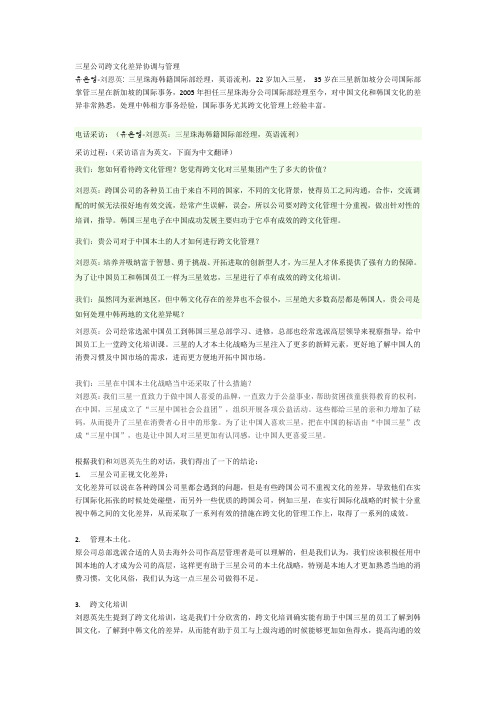
三星公司跨文化差异协调与管理유은영-刘恩英:三星珠海韩籍国际部经理,英语流利,22岁加入三星,35岁在三星新加坡分公司国际部掌管三星在新加坡的国际事务,2005年担任三星珠海分公司国际部经理至今,对中国文化和韩国文化的差异非常熟悉,处理中韩相方事务经验,国际事务尤其跨文化管理上经验丰富。
电话采访:(유은영-刘恩英:三星珠海韩籍国际部经理,英语流利)采访过程:(采访语言为英文,下面为中文翻译)我们:您如何看待跨文化管理?您觉得跨文化对三星集团产生了多大的价值?刘恩英:跨国公司的各种员工由于来自不同的国家,不同的文化背景,使得员工之间沟通,合作,交流调配的时候无法很好地有效交流,经常产生误解,误会,所以公司要对跨文化管理十分重视,做出针对性的培训,指导。
韩国三星电子在中国成功发展主要归功于它卓有成效的跨文化管理。
我们:贵公司对于中国本土的人才如何进行跨文化管理?刘恩英:培养并吸纳富于智慧、勇于挑战、开拓进取的创新型人才,为三星人才体系提供了强有力的保障。
为了让中国员工和韩国员工一样为三星效忠,三星进行了卓有成效的跨文化培训。
我们:虽然同为亚洲地区,但中韩文化存在的差异也不会很小,三星绝大多数高层都是韩国人,贵公司是如何处理中韩两地的文化差异呢?刘恩英:公司经常选派中国员工到韩国三星总部学习、进修,总部也经常选派高层领导来视察指导,给中国员工上一堂跨文化培训课。
三星的人才本土化战略为三星注入了更多的新鲜元素,更好地了解中国人的消费习惯及中国市场的需求,进而更方便地开拓中国市场。
我们:三星在中国本土化战略当中还采取了什么措施?刘恩英:我们三星一直致力于做中国人喜爱的品牌,一直致力于公益事业,帮助贫困孩童获得教育的权利,在中国,三星成立了“三星中国社会公益团”,组织开展各项公益活动。
这些都给三星的亲和力增加了砝码,从而提升了三星在消费者心目中的形象。
为了让中国人喜欢三星,把在中国的标语由“中国三星”改成“三星中国”,也是让中国人对三星更加有认同感,让中国人更喜爱三星。
跨国企业的跨文化管理(中国文化与跨国企业文化冲突).
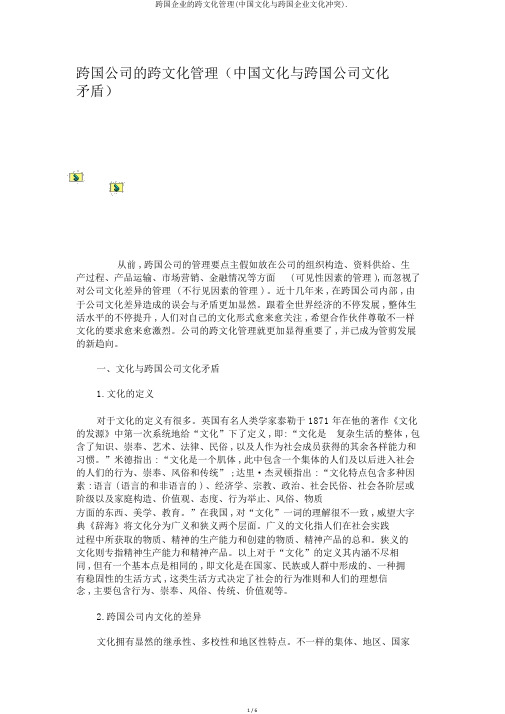
跨国公司的跨文化管理(中国文化与跨国公司文化矛盾)从前 , 跨国公司的管理要点主假如放在公司的组织构造、资料供给、生产过程、产品运输、市场营销、金融情况等方面( 可见性因素的管理 ), 而忽视了对公司文化差异的管理 ( 不行见因素的管理 ) 。
近十几年来 , 在跨国公司内部 , 由于公司文化差异造成的误会与矛盾更加显然。
跟着全世界经济的不停发展 , 整体生活水平的不停提升 , 人们对自己的文化形式愈来愈关注 , 希望合作伙伴尊敬不一样文化的要求愈来愈激烈。
公司的跨文化管理就更加显得重要了 , 并已成为管剪发展的新趋向。
一、文化与跨国公司文化矛盾1.文化的定义对于文化的定义有很多。
英国有名人类学家泰勒于 1871 年在他的著作《文化的发源》中第一次系统地给“文化”下了定义 , 即: “文化是复杂生活的整体 , 包含了知识、崇奉、艺术、法律、民俗 , 以及人作为社会成员获得的其余各样能力和习惯。
”米德指出 : “文化是一个肌体 , 此中包含一个集体的人们及以后进入社会的人们的行为、崇奉、风俗和传统” ; 达里·杰灵顿指出 : “文化特点包含多种因素 : 语言 ( 语言的和非语言的 ) 、经济学、宗教、政治、社会民俗、社会各阶层或阶级以及家庭构造、价值观、态度、行为举止、风俗、物质方面的东西、美学、教育。
”在我国 , 对“文化”一词的理解很不一致 , 威望大字典《辞海》将文化分为广义和狭义两个层面。
广义的文化指人们在社会实践过程中所获取的物质、精神的生产能力和创建的物质、精神产品的总和。
狭义的文化则专指精神生产能力和精神产品。
以上对于“文化”的定义其内涵不尽相同 , 但有一个基本点是相同的 , 即文化是在国家、民族或人群中形成的、一种拥有稳固性的生活方式 , 这类生活方式决定了社会的行为准则和人们的理想信念 , 主要包含行为、崇奉、风俗、传统、价值观等。
2.跨国公司内文化的差异文化拥有显然的继承性、多校性和地区性特点。
浅析跨国企业的跨文化管理
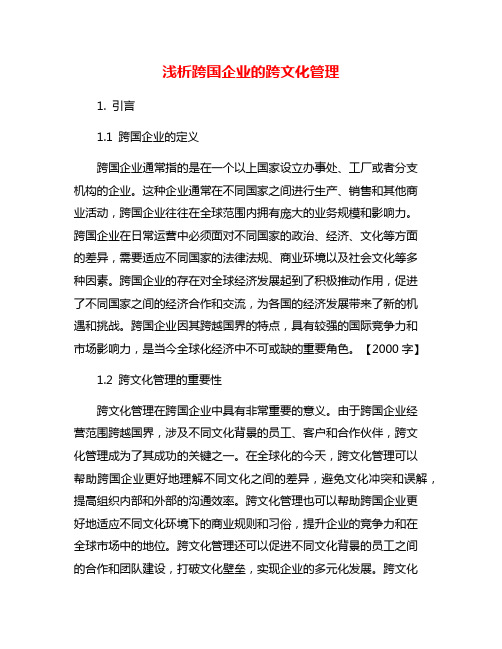
浅析跨国企业的跨文化管理1. 引言1.1 跨国企业的定义跨国企业通常指的是在一个以上国家设立办事处、工厂或者分支机构的企业。
这种企业通常在不同国家之间进行生产、销售和其他商业活动,跨国企业往往在全球范围内拥有庞大的业务规模和影响力。
跨国企业在日常运营中必须面对不同国家的政治、经济、文化等方面的差异,需要适应不同国家的法律法规、商业环境以及社会文化等多种因素。
跨国企业的存在对全球经济发展起到了积极推动作用,促进了不同国家之间的经济合作和交流,为各国的经济发展带来了新的机遇和挑战。
跨国企业因其跨越国界的特点,具有较强的国际竞争力和市场影响力,是当今全球化经济中不可或缺的重要角色。
【2000字】1.2 跨文化管理的重要性跨文化管理在跨国企业中具有非常重要的意义。
由于跨国企业经营范围跨越国界,涉及不同文化背景的员工、客户和合作伙伴,跨文化管理成为了其成功的关键之一。
在全球化的今天,跨文化管理可以帮助跨国企业更好地理解不同文化之间的差异,避免文化冲突和误解,提高组织内部和外部的沟通效率。
跨文化管理也可以帮助跨国企业更好地适应不同文化环境下的商业规则和习俗,提升企业的竞争力和在全球市场中的地位。
跨文化管理还可以促进不同文化背景的员工之间的合作和团队建设,打破文化壁垒,实现企业的多元化发展。
跨文化管理的重要性不言而喻,对于跨国企业来说,只有加强跨文化管理,才能更好地应对全球化所带来的挑战,取得持续的成功和发展。
2. 正文2.1 跨文化管理的挑战跨文化管理的挑战包括面临不同国家和地区的文化差异,语言障碍,沟通不畅,以及管理方式和思维模式的不同。
跨国企业在跨文化管理中需要面对不同的价值观、信念、习俗和行为方式,这可能导致误解、冲突甚至文化冲突。
跨文化管理的挑战也体现在员工团队的多样性,不同国家和地区的员工具有不同的文化背景和工作习惯,需要企业制定有效的管理策略和培训计划来促进团队合作和沟通。
跨国企业还需要应对不同国家和地区的法律法规、政治环境、经济状况等方面的差异,在跨文化管理中需要不断调整和适应,以保持企业的竞争优势和持续发展。
浅析跨国企业的跨文化管理
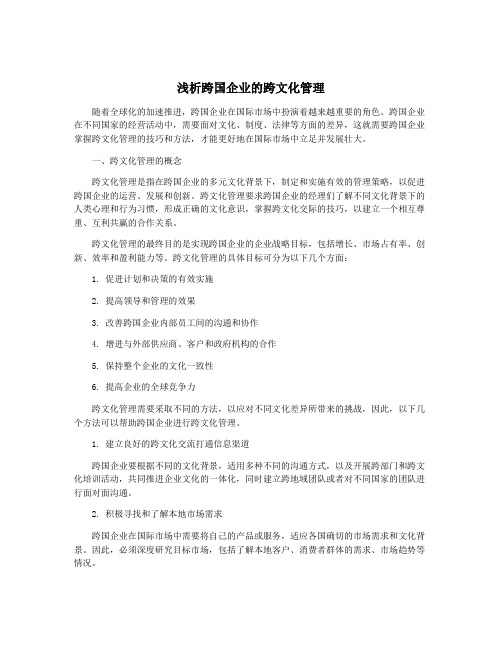
浅析跨国企业的跨文化管理随着全球化的加速推进,跨国企业在国际市场中扮演着越来越重要的角色。
跨国企业在不同国家的经营活动中,需要面对文化、制度、法律等方面的差异,这就需要跨国企业掌握跨文化管理的技巧和方法,才能更好地在国际市场中立足并发展壮大。
一、跨文化管理的概念跨文化管理是指在跨国企业的多元文化背景下,制定和实施有效的管理策略,以促进跨国企业的运营、发展和创新。
跨文化管理要求跨国企业的经理们了解不同文化背景下的人类心理和行为习惯,形成正确的文化意识,掌握跨文化交际的技巧,以建立一个相互尊重、互利共赢的合作关系。
跨文化管理的最终目的是实现跨国企业的企业战略目标,包括增长、市场占有率、创新、效率和盈利能力等。
跨文化管理的具体目标可分为以下几个方面:1. 促进计划和决策的有效实施2. 提高领导和管理的效果3. 改善跨国企业内部员工间的沟通和协作4. 增进与外部供应商、客户和政府机构的合作5. 保持整个企业的文化一致性6. 提高企业的全球竞争力跨文化管理需要采取不同的方法,以应对不同文化差异所带来的挑战,因此,以下几个方法可以帮助跨国企业进行跨文化管理。
1. 建立良好的跨文化交流打通信息渠道跨国企业要根据不同的文化背景,适用多种不同的沟通方式,以及开展跨部门和跨文化培训活动,共同推进企业文化的一体化,同时建立跨地域团队或者对不同国家的团队进行面对面沟通。
2. 积极寻找和了解本地市场需求跨国企业在国际市场中需要将自己的产品或服务,适应各国确切的市场需求和文化背景。
因此,必须深度研究目标市场,包括了解本地客户、消费者群体的需求、市场趋势等情况。
3. 建立多元化文化氛围跨国企业应该对不同国家的文化进行深入研究,学习其特点,以此构建统一的企业文化,同时也要保持一定的灵活性,尽可能根据不同国家的文化和需求进行个性化调整,以建立多元化文化氛围,提高企业的整体文化素质。
4. 人员培训和管理跨国企业需要为其员工提供必要的跨文化培训,学习如何促进跨文化商务关系的建立,并掌握一些术语、关键词,以便在跨文化沟通中更加得心应手。
浅析跨国公司的跨文化管理2200字

浅析跨国公司的跨文化管理2200字摘要:全球经济一体化背景下, 跨国经营企业面临的是一个诸多文化差异之间进行生产经营活动环境。
跨文化管理已成为跨国企业经营过程中不能回避的核心问题。
面对跨文化冲突的风险,对跨国公司的文化差异、文化冲突以及解决方案的挖掘将有助于跨国企业提高核心竞争力。
关键词:文化差异跨文化冲突跨文化管理20世纪90年代以来,经济全球化已达到了前所为有的水平,跨国公司作为世界经济全球化的主体正发挥着日益突出的作用。
跨国公司的一个主要特点就是它的扩展区域范围追求全球布点。
而当其实施“无国界经营”时,其管理活动不可避免地会受到文化差异的影响,这就要求跨国公司需要实施跨文化管理。
跨文化管理目的在于如何在不同形态的文化氛围中,设计出切实可行的组织和管理机制,从而最大地提高企业地综合效益。
▲▲ 一、文化差异文化一词被引入管理学领域,很难找到统一的定义。
许多管理学家对文化比较一致的看法是:文化就是人们的生活方式和认识世界的方式。
人们总是遵循他们已经习惯了的行为方式,这些方式决定了他们生活中特定规则的内涵和模型,社会的不同就在于它们的文化模式的不同。
所谓文化差异,是指不同国家、民族间文化的差别,不同民族的文化都有其独特性、延续性和非物质性的特点。
文化差异主要体现在以下几个方面:语言、价值观、传统文化、宗教信仰、种族优越感、教育水平。
文化差异给企业的跨国经营带来诸多的问题。
经典的跨文化管理理论大多是从不同角度开发了各自的文化维度系统,并根据这些文化维度系统把文化要素分解,进行跨文化比较,找出不同文化的特质,以便人们在跨文化管理的过程中,有效地进行管理。
对于文化差异,著名的比较管理学专家霍夫斯特德的理论给我们提供了认识途径。
他在20世纪70年代末,通过对IBM 50种职业、66种国籍雇员进行116000份问卷,从管理学的角度对现代文明社会人类群体的文化特征进行了宏观分析和界定,并以人类社会对权力差距、个人主义与集体主义、男性化与女性化、不确定性的规避等四个方面的价值判断作为基本标准来对比分析不同民族的文化差异。
论跨国公司的文化差异及跨文化管理优势
论跨国公司的文化差异及跨文化管理优势第一篇:论跨国公司的文化差异及跨文化管理优势论跨国公司的文化差异及跨文化管理优势摘要: 随着全球经济一体化趋势的加强和跨国经营的蓬勃发展,各国企业的组织结构、技术方法、决策方式、控制程序已基本趋同,但不同文化背景下产生的文化差异却成为一个影响管理者管理效果的重要因素,从而给管理者的管理增加了难度。
随着跨国经营活动规模和范围的不断扩大,企业文化差异日益明显。
文化差异极易导致文化冲突,它既能成为跨国经营管理的推动力,也能成为跨国经营管理的阻抗力。
企业应该正确认识文化差异和冲突 ,进行跨国文化的沟通与管理,建立跨文化的企业文化,从而创造出国际竞争优势。
跨国公司的跨文化差异管理成效成为影响跨国公司经营成败的关键因素之一,本文通过对如何认识文化差异,在现有理论的基础上,将跨文化管理和企业管理过程协调统一起来进行研究,并提出了适合于跨文化管理的策略从而达到竞争优势。
关键词:跨国公司、文化差异、文化冲突、跨文化管理、竞争优势一、跨国公司文化差异的产生及体现 (3)二、跨国公司经营过程中面临的文化冲突 (3)1、文化差异极易导致文化冲突 (3)2、跨文化冲突产生的原因 (3)三、跨国公司的跨文化管理策略 (4)1.实行人才本土化战略。
..................................5 2.多元文化相容策略......................................5 3.通过跨文化培训,达成跨文化理解. (5)4、发展与提高跨文化沟通能力 (5)四、跨文化管理的竞争优势 (6)1、降低公司经营成本 (6)2、增强公司的管理创新 (6)3、提高公司人力资源的效率 (6)4、提高公司的国际竞争力 (7)五、结论与启示.................................................7 参考文献: (7)一、跨国公司文化差异的产生及体现美国未来学家奈斯比特在《大趋势》一书中指出:“在日常生活中,随着愈来愈相互依赖的全球经济的发展,我认为语言和文化特点的复兴即将来临。
浅析我国跨国企业的跨文化管理
化 冲突 , 由于 不 同 文 化 背 景 下 成 长 起 来 的 人 们 对 相 同 的事物 可能会 产生 不 同的看法 , 从 而 引 起 不 愉 快 的 体
验 。认知 差异 的类 型也 是多种 多样 的 , 有 些 差 异 只 是 语 言 上 的 沟 通 不 便 ,表 现 的 较 为 缓 和 , 有 些 则 较 为 激
( 5 ) 经 营 理 念 的 冲 突 。经 营 理 念 的 冲 突 在 制 度 文
多彩 的文化背 景 , 目前 , 文 化 可 以 分 为 东 方 和 西 方 两 种 大流 派 , 东 方 文 化 是 以儒 家 思 想 为 基 础 发 展 起 来 的 , 它 看 中集 体 和道 德 。 而西 方 文 化 是 在古 代 希 腊 文 化 和 犹 太
展, 然 后 分 析 了我 国跨 国 企 业 跨 文 化 管 理 的 存 在 的 问 题 , 着 重 论 述 了跨 文 化 管理 的 主 要 措 施 , 从 而 提
出 对国企业 ; 文化 冲突 ; 跨 文 化 管 理
在 经济全 球化 的今 天 , 企 业 跨 国经 营 已 经 成 为 历 可 以 分 为 宏 观 环 境 和 公 司 围 观 制 度 层 面 , 在 某 一 种 制 史 的必 然 。随着跨 国企 业规模 和 范 围的不断 扩大 , 它 度 环 境 下 工 作 的 员 T 身 处 新 的制 度 中 时会 觉 得 不 习 惯
提 高 以及 建 立 共 同 的公 司 文 化 , 因此 , 跨 国企 业 进 行 跨 资 、 激励 机制 上均 存在 较为 明显 的差异 。 在选拔 时 , 中 文 化 管 理 在 跨 国经 营 中 显 得 格 外 的 重 要 。
一
、
企业文化冲突的原 因及表现
浅析跨国企业的跨文化管理
浅析跨国企业的跨文化管理跨国企业是指在多个国家开展业务的企业,而跨文化管理是指在不同文化背景下进行管理的过程。
由于不同国家和地区的文化差异,跨国企业需要进行跨文化管理来应对文化冲突和差异,以确保企业能够有效运营和发展。
跨文化管理的重要性体现在以下几个方面。
通过跨文化管理,跨国企业可以更好地适应和融入当地的文化环境,提高与当地员工、客户和合作伙伴的沟通和合作效果。
跨文化管理有助于解决文化冲突和差异,减少误解和摩擦,提高企业的工作效率和生产力。
跨文化管理还有助于提高企业的世界竞争力,拓展国际市场,实现全球化发展目标。
跨文化管理需要具备的关键要素包括文化意识、跨文化沟通、文化学习和文化适应等。
文化意识是指跨国企业的管理者要认识和理解不同文化之间的差异和冲突,以及这些差异对企业管理和运营的影响。
跨文化沟通是指在不同文化背景下进行有效沟通和交流,需要培养跨文化沟通的技巧和能力。
文化学习是指跨国企业管理者需要主动学习和了解当地的文化背景和习俗,以便更好地适应和融入当地环境。
文化适应是指在跨国企业工作的员工需要逐渐适应和融入当地的文化环境,以便更好地与当地员工和合作伙伴进行合作。
跨文化管理还需要采取一系列的管理策略和措施来应对文化差异和冲突。
跨国企业可以采取多元文化团队的方式,将来自不同文化背景的员工组织在一起,以促进文化的融合和相互学习。
跨国企业可以制定一套文化价值观和准则,以指导员工的行为和决策,从而减少文化冲突和差异产生的负面影响。
跨国企业还可以通过跨文化培训和教育来提升员工的跨文化意识和能力,帮助员工更好地理解和适应不同文化背景下的工作环境。
跨文化管理还需要持续不断地改进和优化。
由于文化是一个动态的概念,不同国家和地区的文化也在不断变化和演变。
跨国企业需要不断关注文化变化的趋势和动态,并根据需要进行相应的调整和改进,以便更好地适应和应对不同文化背景下的管理挑战。
跨国公司的跨文化管理研究
跨文化视角下跨国公司的管理模式研究摘要随着经济全球化和一体化的快速发展,如何在各种文化差异的环境下进行生产经营和管理已经成为众多跨国公司共同面临的一项核心问题。
面临不同文化的冲突和差异,跨国公司如何有效的管理和解决将对提高跨国企业核心竞争力有很大的帮助。
关键字:经济全球化;跨国公司;跨文化管理1.前言在世界经济全球化的发展趋势下,现代企业所面临的市场环境已经由单一的国内市场变成了复杂多样的国际市场,企业要面临很多不同于母国的外部经营环境,包括文化环境、社会环境、经济环境、政治环境等等。
而对于企业经营来说,文化环境的影响是全面的,因为文化是社会生活的总和,因此,企业全球化经营成败的关键就在于跨文化管理是否成功。
中国企业在跨国经营已成为大趋势的环境下可以获得更多的发展空间和机会,如何应对跨文化的企业管理问题成为了各个跨国公司面临的重大难题,如何消除文化差异,实现文化吸收和融合,为中国企业的跨文化管理提供理论依据成为了一项重大课题。
科学应对企业的跨文化管理将对我国企业进军国际市场和以后的长远发展具有重要的意义。
本文是在阅读了许多国内外有关跨文化管理的书籍,并参考了一些中国跨国企业的案例后撰写的这篇论文,并以华为公司为例进行了跨文化管理的分析,对文化差异在企业跨文化管理中的影响和对策进行了研究。
2.相关理论2.1 跨文化管理的涵义所谓跨文化管理又称为交叉文化管理,指的是企业在跨国经营中,对各种存在文化差异的人、事、物和产、供、销开展灵活变通的管理,包括在不同文化背景下设计出切实可行的组织结构和管理机制,妥善处理文化冲突、融合给企业造成的竞争劣势和优势,最大限度地挖掘员工的潜力和实现企业的战略目标(王朝辉.跨文化管理〔M].北京:北京大学出版社,2009年)。
2.2 跨国公司跨文化管理的基本机制2.2.1 理解文化差异跨国公司在进行跨国经营时,必然会接触到不同国家的文化,反映了特有文化的语言、价值观念、思维形式等因素在跨文化管理中会形成障碍,产生矛盾,从而影响跨国经营战略的实施。
- 1、下载文档前请自行甄别文档内容的完整性,平台不提供额外的编辑、内容补充、找答案等附加服务。
- 2、"仅部分预览"的文档,不可在线预览部分如存在完整性等问题,可反馈申请退款(可完整预览的文档不适用该条件!)。
- 3、如文档侵犯您的权益,请联系客服反馈,我们会尽快为您处理(人工客服工作时间:9:00-18:30)。
Discussion on the strategy of cross-cultural management of transnationalcorporations in ChinaAbsstactIn the competitive world of the 21st century the stage, along with the deepening of economic globalization and regional economic grouping that States the internationalization of business has become an irreversible trend of the times. Overcoming the modern enterprises in multinational operation strategy by the international public of the difficulty in communication caused by cultural differences, the effective cross cultural management, are the key to its ability to achieve international business success. Now businesses in the world-wide use of resources, the advantages of their own and combine the advantages of the host country, engaged in transnational production and business activities, but also across cultures. Cultural differences leads to cross-culture management of transnational enterprises in China related issues such as thinking. So how to solve the problem of cultural differences, enhance their competitive advantage, based on the world stage is that we have to explore very carefully.In particular, apart from the introduction this thesis can be divided into the following four parts: Part one: analysis of the concept of cross-cultural management of transnational corporations in China. Definition and measures of cross-culture management.Part II: points out that China's problems and difficulties encountered in the transnational operation of transnational corporations. Comparing Chinese and Western cultural differences in the value of the enterprise culture, institutional differences in culture and labor policies of the three, effective methods of management.Part II: points out that China's problems and difficulties encountered in the transnational operation of transnational corporations. Comparing Chinese and Western cultural differences in the value of the enterprise culture, institutional differences in culture and labor policies of the three, effective methods of management.Part IV: countermeasure and significance of intercultural management, drawing on cross-culture management mode to enhance the management capacity in select cultural coherence partners a way to achieve integration between cultures.Key words: cultural differences in China multinational cross culture managementcatalogThe first chapter Analysis the related concept of cross-cultural management of transnationalcorporations in China–––––––––––––––––––––––––––––––––––––––––––––3 Section 1 Definition of cross-cultural management–––––––––––––––––––––––––––––––3 Section 2 Measures of cross cultural management––––––––––––––––––––––––––––––––3The second dchapter Problems and difficulties encountered by Chinese Multi-NationalCorporation in the transnational management––––––––––––––––––––––––––4 Section 1 Problems encountered––––––––––––––––––––––––––––––––––––––––––––4Section 2 Comparison of Chinese and Western cultural differences–––––––––––––––––4Section 3 Effective management methods–––––––––––––––––––––––––––––––––––––5The third dchapter Comparison and analysis of cross-cultural management and Enterprisecompetitive advantage–––––––––––––––––––––––––––––––––––––––––––––6 Section 1 Relationship between management and culture as well as Chinese and foreign management under the background of specific cultural characteristics–––––––6 Section2 Cross-cultural management and Enterprise competitive advantage––––––––––6The fouth dchapte Cross-culture management strategySection 1 Problem-solving methods––––––––––––––––––––––––––––––––––––––––––7Section 2 inclusive of other cultures––––––––––––––––––––––––––––––––––––––––––7Section3 Cross-culture management of practical significance––––––––––––––––––––––7The first chapter Analysis the related concept of cross-cultural management oftransnational corporations in ChinaSection 1 Definition of cross-cultural managementAccording to statistics, the transnational operation of enterprises accounted for 60% of the total number of companies around the world, almost all of the enterprise, its business enterprises have direct or indirect relations with other countries: cooperation with other countries, or competitive with other countries. The above statistics show that this is the inevitable result of the globalization of the world economy.Across culture management that cross culture management, is in transnational business in the, on different race, and different culture type, and different culture development stage of subsidiary where country of culture take inclusive of management method, its purpose is how in different ideology of culture in the design out feasible of organization structure and management system, in management process in the looking for high of company target, to maximum to reached using enterprise of potential of purpose.Section 2Measures of cross cultural managementWestern scholars have proposed many usability point of view. Canada nanxi·aidele, the famous cross-cultural management (Nancy. J. Adler) point of view, there are three options to solve this problem: the first is lequm. A culture above other cultures, suppression of other cultures; the other is compromised. Refers to intercultural consciously compromise and concession studiously ignored to avoid cultural differences; the third is fusion. Refers to intercultural acknowledged differences with each other on the basis of mutual respect, so as to create a whole new culture, it has stability.First, we need to understand cultural differences, for cultures with due recognition. The cultural conflict in transnational corporations from cultural differences exist in the enterprise. Cultural differences and friction caused by the extent and type, only the first recognition of cultural differences and to take corresponding measures. Transnational business managers to broaden the cultural identity and intercultural communication and understanding of knowledge.Secondly, intercultural education. Cross-culture management of training high-quality personnel. Main content: awareness and understanding of the culture of other peoples and company through the learning of different languages; address the issue of cross-cultural communication. Reducing cultural conflicts you may encounter cross-cultural employee issues, quickly adapt to the environment and to play its due role strengthened team spirit and company cohesion.Third, the common sense of management. Realizes with the ever-running cultural innovation. Finally, step by step reconstruction of enterprise culture. Multinational investment in China, formed unique enterprise culture, this is a more complex process, requiring long-term coordination in order to succeed.The second dchapter Problems and difficulties encountered by Chinese Multi-NationalCorporation in the transnational managementSection 1Problems encounteredFirst, the cultural differences make it easier for multinational analysis and understanding of the issues from a multidimensional perspective, there are more programmes to choose from, more choice and management of transnational enterprises more complete; cultural differences on multinational enterprise knowledge and culture also have complementary strengths, have updated views and ideas into enterprises, and improve the competitiveness of State-owned enterprises in the market.Second, the culture of people from different cultures have different needs and expectations, increasing job uncertainty and complexity, and even lead to confusion and conflict in transnational enterprises. Meanwhile, cultural differences between employees with different cultural backgrounds on decision making and different levels of understanding or implementation of the management system, so that decision-making becomes even more difficult. Ignoring cultural traditions shaped by different ethnic and racial superiority, way of thinking and perceptual knowledge, communication misunderstandings caused by different cultural symbols, differences in cultural attitudes often leads to cultural conflict, cultural conflicts often lead to bitter, deeply conservative and non-rational reflection and other adverse consequences.Cross-culture management in transnational operation friction is a time-consuming process. Can also reduce friction, edges and corners rounded. Constantly running, so continue to mature.Section 2 Comparison of Chinese and Western cultural differencesComparison of business enterprises in Western countries and, for example, can be seen from the following comparison, major cultural differences in the value of the internal cultural, institutional culture and policy aspects of labor and personnel.Risk awarenessAttitudes towards achievementWestern countries : Say bluntlychina: Lack of initiativeExpress wayW estern countries :directlychina: Talk behindInstitutional cultureWestern countries : More legal weaponschina: with "love" governancesalaryWestern countries : Capacity settingchina: Qualifications and educationPersonnel arrangementWestern countries : Capacity is the most importantchina: Heavy networkTalent flowWestern countries : Encourage your employees theirchina: Not used to staff "hurdles"Section 3 Effective management methodsNanxiaidele, the famous cross-cultural management point:First, cross cultural change from the first phase between culture and human resource management for businessSecond, the company according to the market development of different marketing strategies Third, enterprises have the diversity of productsThe third dchapter Comparison and analysis of cross-cultural management and Enterprise competitive advantageSection 1Relationship between management and culture as well as Chinese and foreign management under the background of specific cultural characteristicsChinese and foreign management under the background of specific cultural characteristicsCultural background:First, China - the "golden mean" cultureSecond, Germany - expert culture. German product quality is extremely seriously, the staff after a rigorous professional training.Third, Japan - "team" spirit and lean production culture.Fourth, the United States of America's personal value and contract is the supremacy of cultureSection2 Cross-cultural management and Enterprise competitive advantageRefers to corporate competitive advantage in competition with peers, relative to the competitors an advantage, enterprises can receive more than the industry's average yield returns.Cross-cultural management enable organizations to learn and accept other culture while creating their own competitive advantages.The fouth dchapte Cross-culture management strategySection 1 Problem-solving methodsWhile the process of globalization promotes the fusion of the whole world, but the differences in Chinese and Western culture remains a cross in front of cross cultural management should a major problem. How to cross-culture management, has become an important issue. We should do the following:.First, avoid any prejudice is due to different values. Culture is not good or bad, only you don't belong.Section 2 inclusive of other cultures.In a multinational enterprise, people from all corners of different cultural backgrounds requires an enterprise managers must learn to accommodate each other in different cultures.Section3 Cross-culture management of practical significanceFinally, pay attention to details. Learn about other cultures, inclusive and respectful attitude, details about other cultures, on the details of the deal reflects an intercultural managers ' professionalism。
